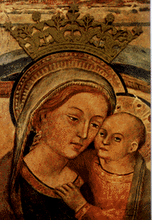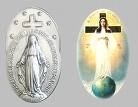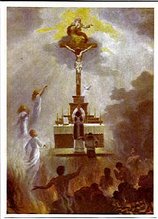
Compunction: n. the pricking of conscience. (Webster, NY. 1988)
The dignity of man requires a well-formed conscience. We are not to follow the whims of our feelings as is so popularly thought today. Each human being has the responsibility to seek the truth and conform to it. We are fortunate in the Catholic faith to have a rich and full Tradition and the Magisterial teachings from which to learn God’s Truth. As Catholics we are not to conform to this world’s ideas of “following our hearts” nor to simply “do what we think best” No – we must learn through our holy religion what is the will of God and conform our wicked selves to it.
Compunction is a word I was unfamiliar with until recently when I came across an entire chapter on the subject in Thomas à Kempis’ “Imitation of Christ” The author states clearly that compunction is to be used as way to avoid further burdening the soul with sin and in growing a vital fear of God.
“Give thyself to compunction of heart and thou shalt find devotion.
Compunction opens the way to much good, which distraction is wont
quickly to lose.”
In other words, when you feel the “pricking” of conscience associated with some sinful act, give yourself to this compunction of heart and repent. Acknowledge your sin and its wrongfulness before your God who sees and knows all. If you are not sorry for this act, ask for the grace to be sorry. Make a firm decision of amendment, say an act of contrition or simply tell God in your own words your understanding of the wrongness of your action.
Yes, we must trust in God’s mercy but we must temper our trust with fear of God’s judgment. It is often related to this generation how former generations focused far too much on God’s fearful judgment, instilling the fear of hell as a means to teach and instruct others to strive for virtue. It would seem in these times the pendulum has swung to an over-emphasis on God’s mercy. Yes, our Lord is merciful, but He is equally just. This equates to a balance that is oft missing in our understanding of sin and our way of living. If we trust in God’s mercy to the point that we blindly believe we can do anything, even the worst of sins and He’ll just happily invite us to heaven after death is a grave misunderstanding of God.
If we follow our hearts blindly and without proper formation according to God’s ways – ignoring the prick of compunction, we run a grave risk of joining the many who enter upon the wide road that leads to destruction. Try as I might I cannot improve upon Kempis’ words:
“The subjects for just grief and interior compunction are our
vices and sins, in which we lie entangled in such a manner
as seldom to be able to contemplate heavenly things. If thou
wouldst oftener think of thy death than of a long life, no doubt
thou wouldst more fervently amend thyself. And if thou didst
seriously consider in the heart the future punishment of hell or
purgatory, I believe thou wouldst willingly endure labor and pain
and fear no kind of austerity.
Because these things reach not the heart, and we still love the things
Which flatter us, therefore we remain cold and very sluggish. If is
Oftentimes a want of spirit which makes the wretched body so easily
Complain. Pray, therefore, humbly to Our Lord, that He may give
Thee the spirit of compunction, and say with the prophet, “Feed me,
O Lord, with the bread of tears and give me drink of tears in measure.”
Let us strive to pray, to study our holy Catholic religion, confess our sins often and listen to that faint voice, that mildly painful prick of conscience that bids us to walk through the narrow gate, which leads to heaven.
(Source: My Imitation of Christ by Thomas à Kempis. Published by the
Confraternity of the Precious Blood, Brooklyn, NY. 1954)




















01.jpg)





























3 comments:
Hello, thanks for visiting my blog, in answer to your questions most of the buildings in the med are the same yes.
I'm reading The Imitation of Christ, too. I had always wanted to read it, but when I read Story of a Soul and St. Therese kept referencing it, I had to get it. So far it is wonderful. A great read and reference!
The Imitation of Christ, which I used as a reference in this article, is a great read. Its one of those books that never tires, never becomes lackluster, always inspires and is of such importance that many, many saints have read it and been helped by it to gain in sanctity. I never tire of it!
Post a Comment